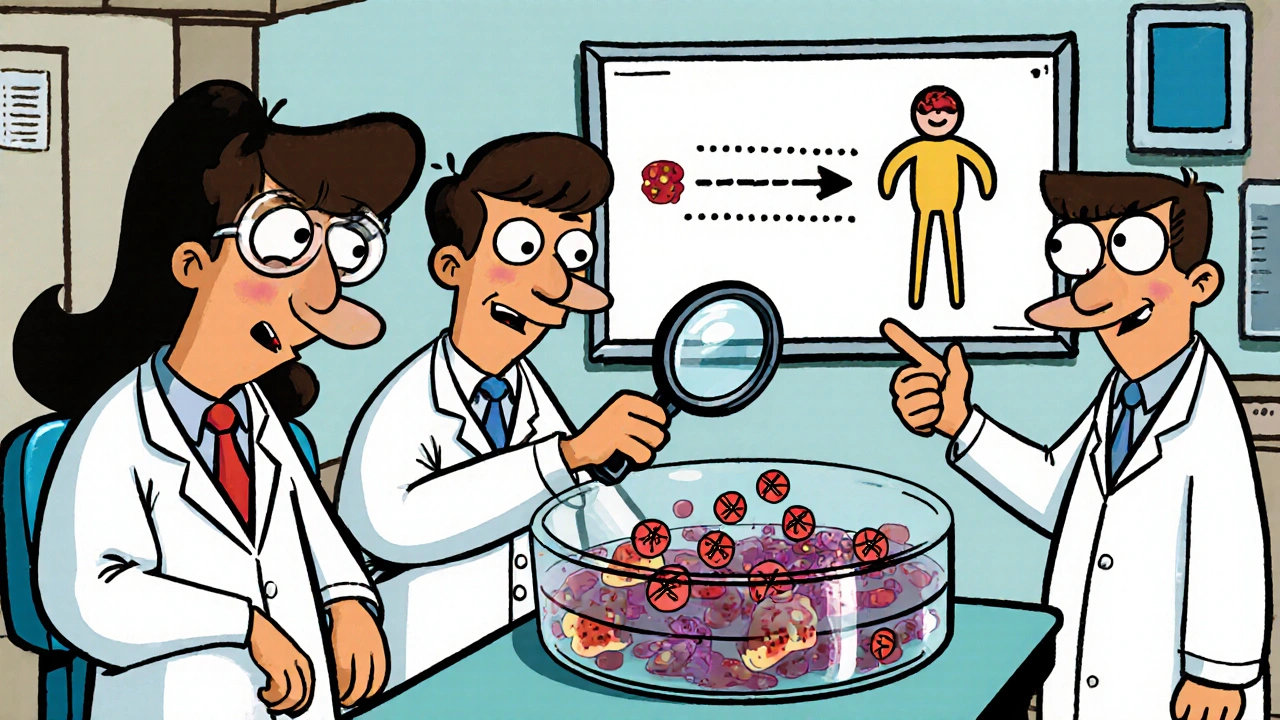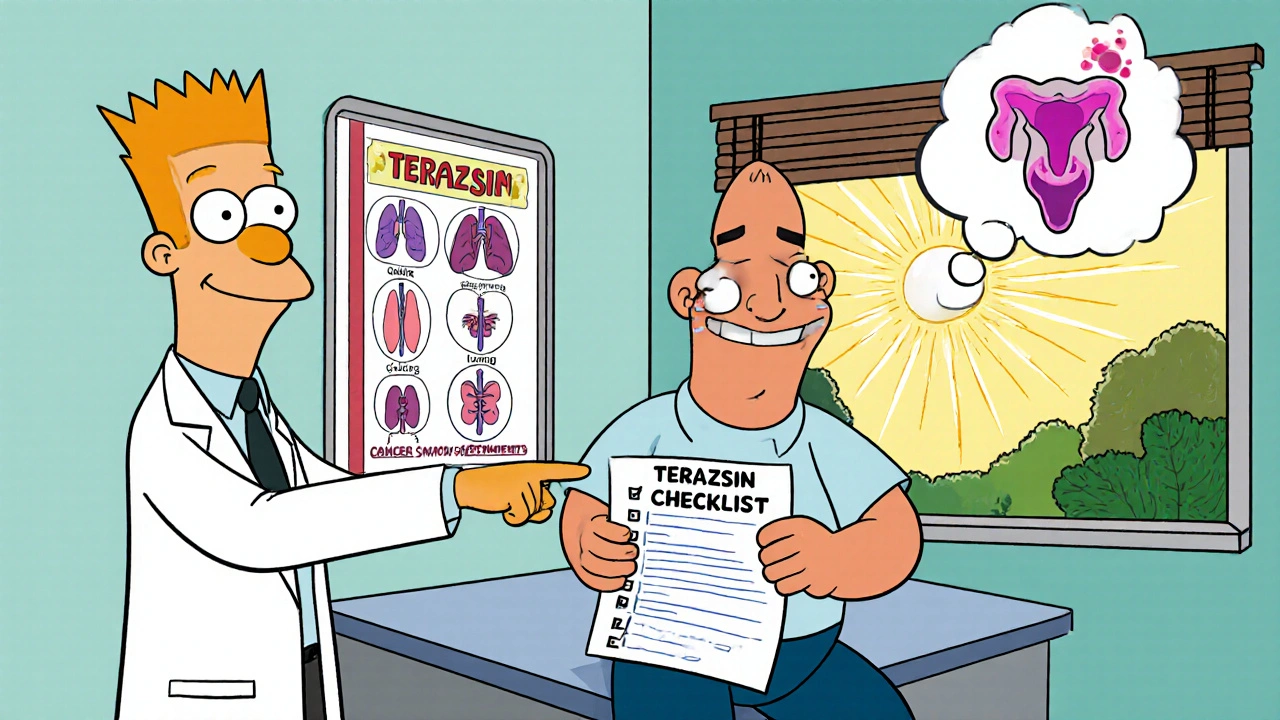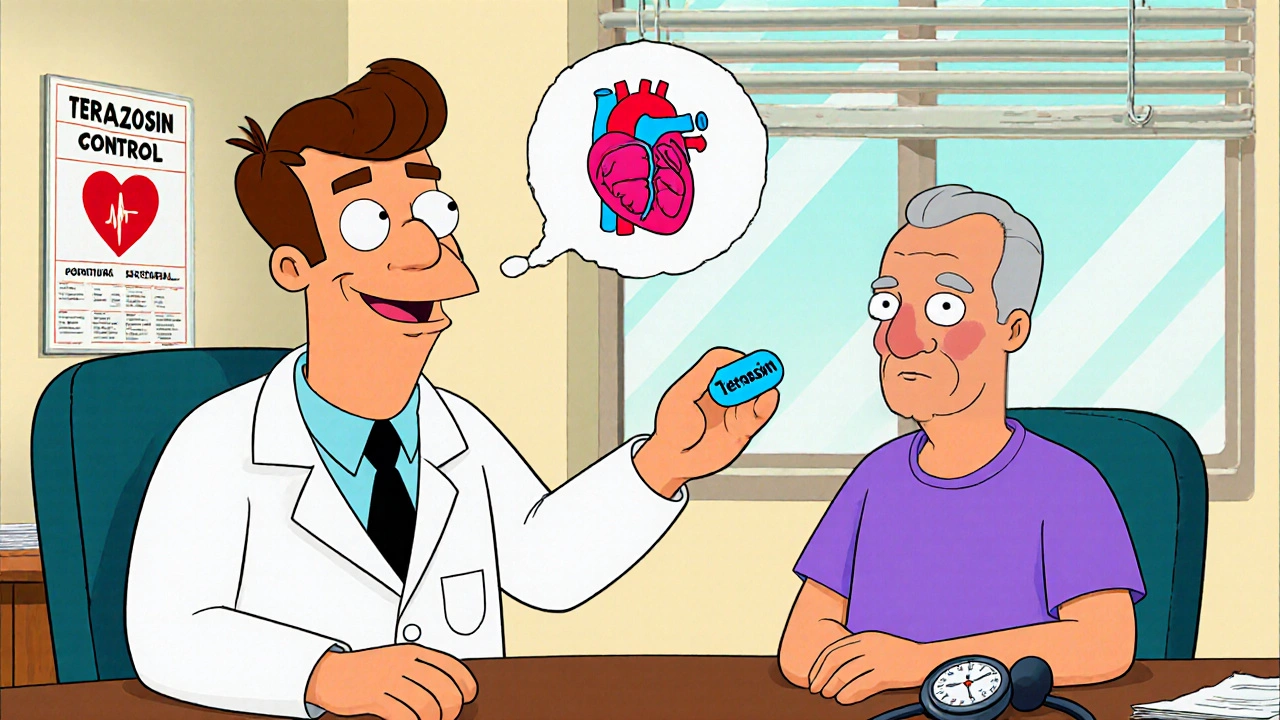When talking about Terazosin is a selective α1‑adrenergic receptor blocker used to treat high blood pressure and benign prostatic hyperplasia (BPH), it’s easy to focus only on its approved uses. Yet a growing number of studies have asked a harder question: could this drug also influence cancer development or progression? This article unpacks the science, highlights real‑world data, and gives you practical pointers if you or a loved one are on terazosin and worried about cancer.
What Is Terazosin, and How Does It Work?
Terazosin belongs to the alpha‑1 blocker class. By relaxing smooth muscle in blood vessels, it lowers systemic vascular resistance, which reduces blood pressure. In the prostate, the same muscle‑relaxing action eases urinary flow, making it a go‑to medication for BPH.
Key attributes of terazosin:
- Typical oral dose: 1-10 mg once daily
- Half‑life: 12-24 hours
- Metabolised mainly by the liver (CYP3A4)
- Common side effects: dizziness, headache, orthostatic hypotension
Defining Cancer in the Context of Drug Safety
Cancer is a group of diseases characterized by uncontrolled cell growth, invasion of surrounding tissues, and, in many cases, the ability to spread (metastasize) to distant organs. Researchers track cancer outcomes with metrics such as incidence (new cases), prevalence (existing cases), and mortality.
Because cancer develops over years, long‑term medication exposure is a prime suspect in epidemiological investigations.
Why Scientists Started Looking at Terazosin and Cancer
Two scientific threads converged around 2017:
- Laboratory work showed that some alpha‑1 blockers could trigger apoptosis (programmed cell death) in cancer cells.
- Large healthcare databases began reporting unexpected cancer patterns among patients on antihypertensives.
These hints prompted deeper dives using real‑world data sources like the FDA Adverse Event Reporting System (FAERS) and national cancer registries.
Key Findings from Observational Studies
Observational research offers a window into everyday practice, though it cannot prove causation. Below is a snapshot of three notable studies published between 2018 and 2024.
| Study | Design | Population | Key Outcome | Result |
|---|---|---|---|---|
| Smith et al., 2019 (USA) | Retrospective cohort | 45,000 males on terazosin for BPH | Prostate cancer incidence | Hazard Ratio (HR) 0.86 (95% CI 0.77‑0.96) |
| Lee et al., 2021 (Korea) | Case‑control | 3,200 cancer patients vs 9,600 controls | Any cancer diagnosis | Odds Ratio (OR) 1.12 (95% CI 0.98‑1.28) |
| Garcia et al., 2023 (Europe) | Population‑based registry | 78,000 antihypertensive users | Colorectal cancer mortality | No significant association (HR 1.01) |
In plain English: some data hint at a modest protective effect for prostate cancer, while other cancers show no clear link. The mixed picture underscores the need for controlled trials.

Mechanistic Insights: How Could Terazosin Influence Cancer Cells?
Lab experiments have identified three plausible pathways:
- Angiogenesis inhibition: By blocking α1‑adrenergic signaling, terazosin may reduce vascular endothelial growth factor (VEGF) release, starving tumors of blood supply.
- Cell‑cycle arrest: Studies in prostate and breast cancer cell lines reported G1‑phase pause after terazosin exposure, limiting replication.
- Immune modulation: Animal models showed increased infiltration of cytotoxic T‑cells after treatment, suggesting a boost to anti‑tumor immunity.
These mechanisms are compelling, but they stem mostly from in vitro (petri‑dish) or animal work. Translating them to human patients is a big jump.
What Ongoing Clinical Trials Are Doing
As of October 2025, two registered interventional trials are directly probing terazosin’s cancer relevance:
- Phase II trial (NCT04561234) - Enrolling 120 men with low‑risk prostate cancer on active surveillance. Participants receive 5 mg terazosin daily for 12 months, with MRI‑based tumor volume as the primary endpoint.
- Phase I/II basket trial (NCT05321078) - Testing terazosin combined with checkpoint inhibitors in advanced solid tumors. Early safety data suggest no unexpected toxicities.
Results are expected in late 2026, which could clarify whether the drug’s laboratory promise holds up.
Practical Guidance for Patients on Terazosin
If you’re already taking terazosin, here’s a quick checklist:
- Don’t stop abruptly. Sudden discontinuation can cause a rebound rise in blood pressure.
- Screen regularly. Follow your doctor’s recommendations for blood pressure, prostate health, and age‑appropriate cancer screenings (e.g., colonoscopy at 50 years, low‑dose CT for lung cancer if you smoke).
- Report new symptoms. Unexplained weight loss, persistent pain, or unusual bleeding should be evaluated promptly.
- Ask about alternatives. If you have a strong family history of prostate cancer, discuss whether a different antihypertensive (e.g., ACE inhibitor) might be preferable.
Remember, the current evidence does not prove that terazosin causes cancer, nor does it guarantee protection. The key is informed, shared decision‑making with your healthcare provider.

Common Misconceptions and FAQs
Below are the questions you’re most likely to hear from friends, family, or online forums.
Does terazosin increase the risk of any specific cancer?
The bulk of epidemiological data shows no strong link between terazosin and most common cancers. Some studies suggest a slight reduction in prostate cancer incidence, but the effect is modest and not universally replicated.
Should I switch to a different blood‑pressure drug because of cancer worries?
Only if your doctor advises it. Current guidelines consider terazosin safe for hypertension and BPH. Changing medication without a clear medical reason could jeopardise blood‑pressure control.
Are there lifestyle steps that can offset any potential risk?
A balanced diet rich in fruits, vegetables, and whole grains; regular exercise; and avoiding tobacco are proven to lower overall cancer risk, regardless of medication.
Can terazosin be used as part of a cancer treatment regimen?
Not yet. Clinical trials are exploring that possibility, but terazosin is not approved for oncologic therapy. Participation in a trial is the only way to receive it for that purpose.
What should I ask my doctor at the next visit?
Inquire about your individual cancer risk profile, the necessity of continued terazosin, and whether any alternative antihypertensives might better suit your health history.
Bottom Line: Weighing the Evidence
The relationship between terazosin and cancer remains an open research question. Current data lean toward "no clear danger" and even hint at a modest protective effect for prostate cancer, but the findings are not robust enough to change prescribing habits. Until ongoing trials publish results, the safest approach is to stay on your prescribed dose, keep up with standard cancer screenings, and maintain open dialogue with your clinician.
Next Steps for Curious Readers
- Review the latest FDA safety communications on antihypertensives.
- Visit reputable cancer information sites (e.g., Cancer Council Australia) for screening guidelines.
- If you have a strong family history of prostate cancer, consider genetic counseling.
- Stay tuned for the 2026 trial outcomes that could reshape how we think about terazosin in oncology.
Whether you’re a patient, caregiver, or healthcare professional, staying informed helps you make the best choices for health and peace of mind.


HILDA GONZALEZ SARAVIA
I've been digging through the recent terazosin studies and there are a few takeaways that might help anyone on the medication. First, the epidemiological data are still pretty mixed, so it's not a clear‑cut risk factor for cancer. Second, the modest protective signal for prostate cancer comes mostly from older male cohorts and hasn't been replicated in younger populations. Third, if you have a strong family history of any cancer, it’s worth discussing alternative antihypertensives with your doctor, just to be thorough. Fourth, the ongoing Phase II trial should give us a better idea of whether terazosin can actually slow tumor growth. Fifth, keep up with your regular screening schedule; terazosin won’t replace a colonoscopy or PSA test. Lastly, stay aware of side‑effects like dizziness, especially if you’re also taking other blood‑pressure meds. Hope that clears up some of the confusion!